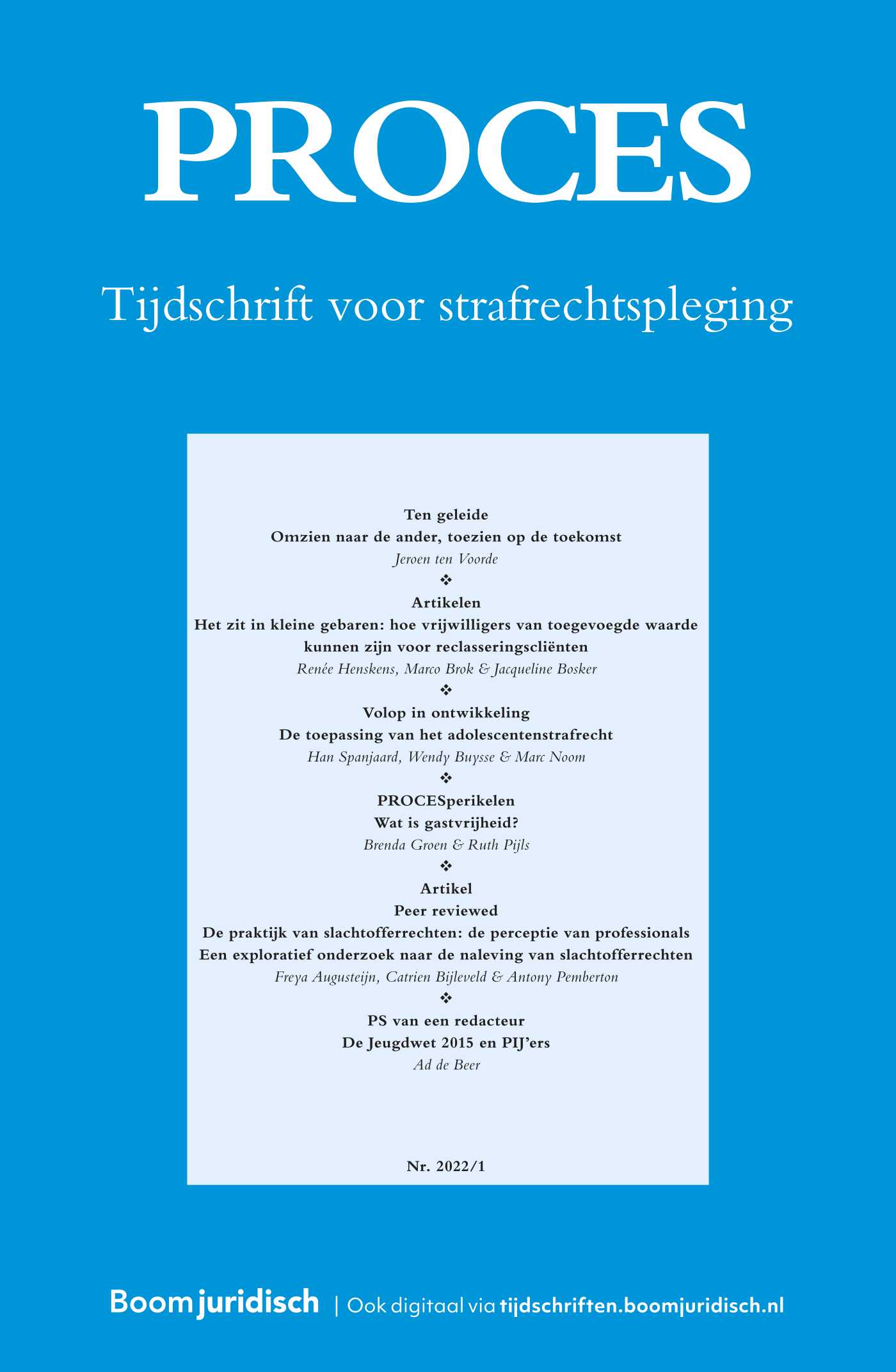|
This editorial offers an introduction to the current issue. |


PROCES
Meer op het gebied van Criminologie en veiligheid
Over dit tijdschriftMeld u zich hier aan voor de attendering op dit tijdschrift zodat u direct een mail ontvangt als er een nieuw digitaal nummer is verschenen en u de artikelen online kunt lezen.
| Redactioneel |
Van Terreurboys naar Criminele Pubers |
| Trefwoorden | editorial |
| Auteurs | Mr.dr. Maartje van der Woude |
| SamenvattingAuteursinformatie |
| Diversen |
mr. Rob Blekxtoon |
| Auteurs | Klaas de Graaff |
| SamenvattingAuteursinformatie |
|
In memoriam Rob Blekxtoon |
| Artikel |
Politiecultuur: een empirische verkenning in de Nederlandse context |
| Trefwoorden | police, police culture, police style, stress factors |
| Auteurs | Prof.dr.ir. Jan Terpstra en Dorian Schaap |
| SamenvattingAuteursinformatie |
|
To what extent have the Dutch police a distinct culture that corresponds with the image of police culture as it has been described in American studies of the 1960s and 1970s? A survey among 260 police officers shows that the Dutch police culture has a strong emphasis on mission, action, and cynicism. Other well-known elements, like conservatism and machismo proved to be less important. In accordance with the stress-coping theory police culture proved to be stronger if police officers were confronted with internal and external stress. Police culture is positively related with a crime fighting police style, and negatively with a service/guardian style. No relations could be found with a professional police style. |
| Artikel |
Overdag naar de eigen school en ’s nachts in detentieNachtdetentie als recht en niet beperkt tot de voorlopige hechtenis |
| Trefwoorden | night detention, juvenile detention, night detention, juvenile criminal law and penitentiary law |
| Auteurs | Mr. Jolande uit Beijerse en Mr. Ingeborg Jansen |
| SamenvattingAuteursinformatie |
|
Since 2003, Dutch juveniles on remand who go to school or have work can be held in ‘night detention’: they attend their school or work during the day and spend the nights and weekends in a young offender institution. The authors examine how this form of youth detention relates to basic principles in juvenile criminal law and penitentiary law. They argue that based on international standards stating that juveniles should be detained with as few restraints as possible, night detention should be made available if circumstances allow it not only for juveniles on remand, but for juveniles subject to any form of detention. |
| Praktijk |
Het belang van het kind en de gang van zaken in de praktijk |
| Trefwoorden | minors, criminal justice, juvenile court |
| Auteurs | Mr. Coosje Peterse |
| SamenvattingAuteursinformatie |
|
The author describes new developments of criminal justice in practice. |
| Artikel |
De leeftijdsgrenzen in het jeugdstrafrecht en het jongvolwassenenstrafrecht |
| Trefwoorden | juvenile justice, adolescent justice, age limits, neurobiological and psychological development |
| Auteurs | Mr. Marjolein Herweijer |
| SamenvattingAuteursinformatie |
|
Recent scientific studies have shown that a major part of juvenile delinquency is due to the incomplete development of adolescents and will stop before the age of 23. The Convention on the Rights of the Child and the accompanying General Comment Children’s rights in juvenile justice give detailed guidelines about juvenile justice. This article focuses on an advice of the Council for the Administration of Criminal Justice and Protection of Juveniles, according to which both of these developments require adjustment of the lower and upper age limit of criminal responsibility for juvenile offenders and justify a special criminal law for adolescents. |
| Column |
De ogen van de kinderrechter |
| Trefwoorden | juvenile court |
| Auteurs | Mr. Ad de Beer |
| SamenvattingAuteursinformatie |
|
In a column a journal editor or an author expresses his or her opinion on a particular subject. |
